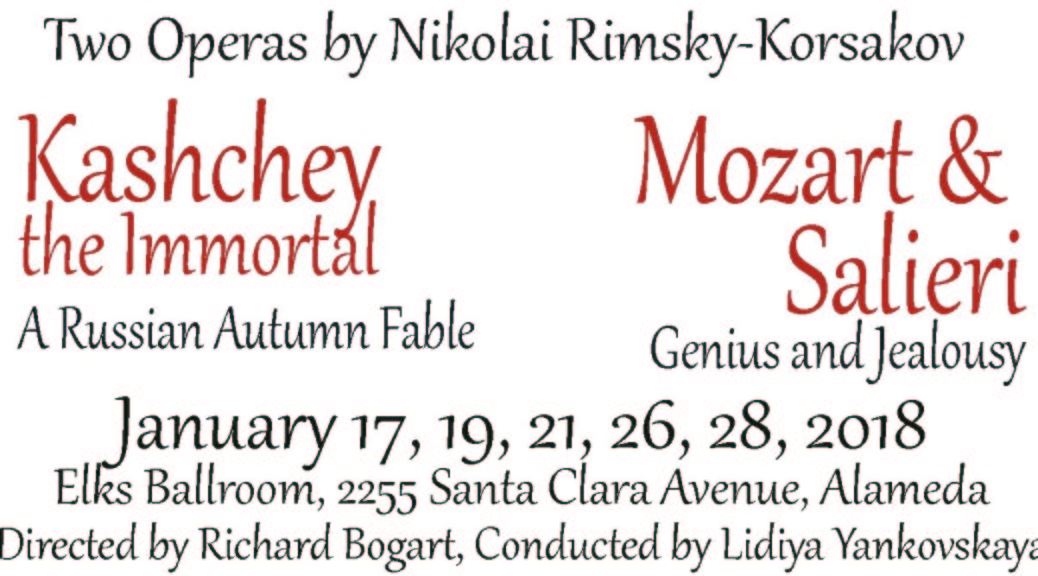
RARE RUSSIAN FAIRY TALE OPERA INVADES THE BAY AREA
ALAMEDA, CA—In the S.F. East Bay, the tranquil community of Alameda is the home of a new opera troupe, presenting an ambitious double bill of Rimsky-Korsakov, half of it representing an important staging of a neglected work.
Using the ballroom of an Elks Lodge and making do with a modest budget, the Island City Opera gave what was termed the US premiere of the one-act fantasy “Kashchey the Immortal” (1902), named after the evil wizard also encountered in the subsequent “Firebird” ballet. Perhaps the inspiration for the plot of “Turandot” as well.
Though rarely performed in the West, this opus is both appealing and viable, using several leitmotifs inspired by Wagner’s musical innovations, and featuring several attractive arias and ensembles, plus magic, dancers and a chorus or two—an awful lot crammed into a 65-minute work staged and performed in the original Russian. The magic alone is a challenge, with a mirror popping up out of nowhere, and later the villainess turning into a willow tree. An ethereal being named variously Wind and Storm-Knight, singing baritone, flies back and forth between castles, presumably in a flash.
Each of two malevolent characters captures and separates the love couple, Tsarevna and Prince Ivan.
Captured by the villainess, the heroic Prince Ivan is fed a cladestine beverage and right away pours out declarations of love for the lady, having abruptly forgotten his true-love Tsarevna. The villainess chops off the heads of men captured, akin to “Turandot,” an opera which never took shape till decades later. But of course she is so smitten with Ivan that she cannot chop much beyond carrots. With the help of Wind, Ivan zooms off to the castle of the Kashchey, where because of tears shed by the villainess, the immortal Kashchey monster finally falls dead (Don’t ask me to explain!!). The Tsarevna is liberated in time for her melodious aria and the final quartet, and the villainess with the heart of gold is transformed into a willow tree (aided by four willowy dancers). The willow tree, like the singing, was Russian.
One facet I enjoyed was the quaint staging technology with movable flats on stage, like the theaters of early 49ers. Furthermore, a ballroom with seating of just 230 (!) recalls an even earlier time, when nobles brought compact productions into their marginally suited foyers for their guests. Not all these facets help the overall effort. At the third performance, the reduced orchestra of 22 couldn’t agree on pitch, and one principal singer entered far too soon and had to back offstage sheepishly. However at the fifth performance, it jelled nicely, the laudable 24-member chorus and all. I’d gladly return for another Rimsky shot, especially with these singers: character tenor Alex Boyer in the melodramatic title role, a lustrous soprano Rebecca Nathanson all but stealing the show as Tsarevna, and baritone Igor Vieira as Ivan. And mezzo Silvie Jensen provided a villainess whom you could both love and hate.
The companion work was the mini-opera “Mozart and Salieri,” built on the long-discredited allegation that rival composer Salieri poisoned Wolfgang Mozart out of jealousy. When the bass Salieri wasn’t off on some endless ruminative soliloquy, rumbling and grumbling, the chipper tenor Mozart popped up energetically and quoted from his operas until blowing his great chance at drama, leaving the stage to die. Clearly, the wrong man got poisoned. The manipulative Salieri’s most remarkable feat was restoring the eyesight of the Blind Fiddler in time for taking the bows.
Lidiya Yankovskaya conducted, while Richard Bogart was stage director. For the four-year-old opera company run collectively by a six-member board, this bill was a promising and daring foray, particularly since so few Russian operas have been produced in the Bay Area since the Millennium, once conductor Valery Gergiev had stepped down as a fixture at the S.F. Opera.
Island City Opera staging a rare Rimsky-Korsakov double-bill, Jan. 17-28, at the Elks Lodge Ballroom, 2255 Santa Clara Ave., Alameda, CA. For ICO info: (510) 263-8060, or go online.